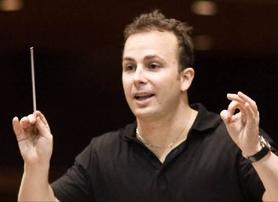 Yannick Nézet-Séguin.
Yannick Nézet-Séguin. Canada’s super-conductor, Yannick Nézet-Séguin — who leads the Philadelphia Orchestra, the Rotterdam Philharmonic and Montreal’s Orchestre Métropolitain — has added yet another podium to his list. And it’s a big one.
In a press statement, Nézet-Séguin, 41, said all the right things: “I will make it my mission to passionately preserve the highest artistic standards while imagining a new, bright future for our art form.”
But the Montreal-born maestro seems in no hurry to start his new job. In the 2017-18 opera season, he will be “music director designate” — and it won’t be until 2020-21 that he will well and truly be the Met’s music director.
There are many reasons for this. The most obvious is Nézet-Séguin’s contract with the Philadelphia Orchestra that lasts until 2026. He will also remain in charge of the Orchestre Métropolitain, although he will step down from his post in Rotterdam at the end of the 2017-18 season.
But the wheels of a $310-million operatic monster like the Met also turn slowly, with seasons scheduled up to five years in advance. That means Nézet-Séguin will be working with plans inherited from other people, Levine and Met general manager Peter Gelb.
Because of the remarkable way his career has unfolded, Nézet-Séguin has a thing or two to learn.
His meteoric rise as an orchestral conductor occurred because he possesses an almost magical ability to make a good first impression. In 2007, he was appointed music director of the Rotterdam Philharmonic after leading the orchestra only twice. Three years later, he was named music director of the Philadelphia Orchestra after just two concerts with the ensemble.
The flip-side is less experience, where opera is concerned. Nézet-Séguin guest-conducted his first Met production in 2010 (Bizet’s Carmen) and has returned once a year since then to lead a few operas. He’s also conducted operas in some other fancy places: at Milan’s La Scala, London’s Covent Garden and at the Salzburg Festival, among others. But there are gaps in his repertoire. Thus far, he has tackled no Wagner operas, or many by Puccini, and almost no operas written in the past 100 years.
As a result, he will spend the next few years at the Met building his operatic experience. That includes The Flying Dutchman, his first Wagner, next season. The Met’s plans call for him to increase to five productions a season when he finally becomes music director.
Nézet-Séguin arrives at the Met during a volatile time for opera in New York. In the 2014 fiscal year (ended July 31), the Met lost US$22 million. In 2015, the company turned this around to a US$1-million surplus — but this was largely through cutting costs, not by increasing revenue. Structural problems remain, and ticket sales are on a downward slide: last year, the Met sold just 74 per cent of its tickets.
As well, three years ago, the Big Apple’s other opera company, the New York City Opera, went broke. The fact no wealthy patron stepped up to bail it out raised questions about the value of opera to the city’s elite.
Nézet-Séguin is no stranger to leading an artistic organization in tough times. When he took over in Philadelphia, the ensemble had just emerged from bankruptcy protection. Since then, ticket revenue has increased by 45 per cent, and the orchestra is in the midst of an ambitious $100-million endowment campaign.
Still, all things considered, giving Nézet-Séguin a few years to learn the ropes at the Met may not be such a bad idea at all.
© Colin Eatock 2016
 RSS Feed
RSS Feed

